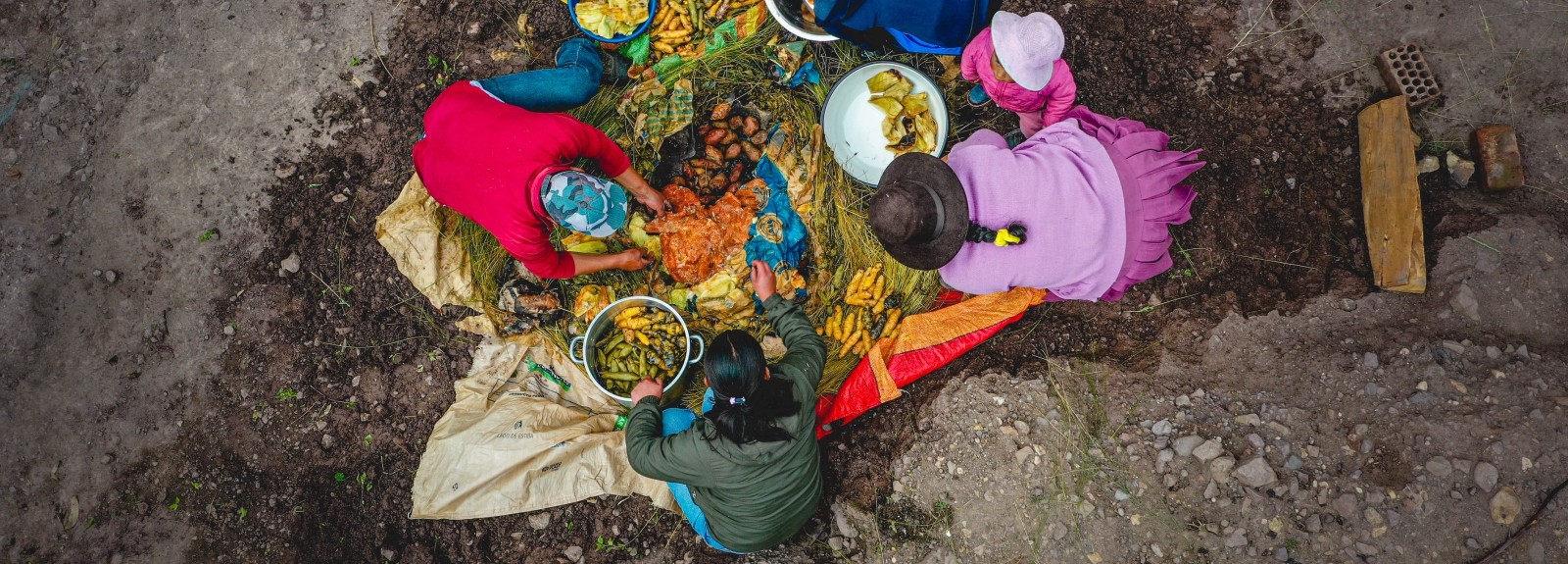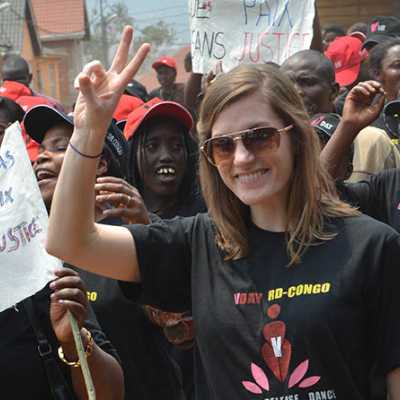After a two-year drought, farming families in Peru were on the verge of starvation. In 2011, our generous donors began helping them revitalize their farms and expand their livelihoods. After a lot of hard work, today these families are thriving — and they are offering up their own gestures of love in return.
On a cool morning in early autumn, a van slowly winds its way up a steep mountain.
Castrovirreyna, Peru, is perched high in the Andes. It’s a 12-hour drive from Lima — parts of it on a narrow, unpaved road better suited to a mountain goat than a vehicle full of passengers. At one point, everyone moves to one side of the van to avoid tipping over. Another time, they must wait for hours while a construction crew fills a massive ditch blocking their path.
The Cocha community of Castrovirreyna, Peru, is located at 12,000 ft. above sea level.
But Lutheran World Relief staff are used to carrying your love to hard-to-reach places. So, onward and upward to Castrovirreyna they go, a familiar journey after so many years.
When LWR first started working alongside farmers there in 2011, some were surviving on nothing but potatoes. It’s been a long journey to get to this point, but today — thanks to the loving generosity of donors like you — families in Castrovirreyna are thriving.
Pachamanca: A celebratory feast
After an elevation gain of nearly 13,000 feet, staff members arrive to find a surprise waiting for them. Farmers Juvenal Sosa Quilca and his wife Eusebia Canales are preparing pachamanca in their honor.
In the local language of Quechua, pachamanca means “earth pot.” This centuries-old cooking method involves building a fire under a pile of stones, placing meat and vegetables atop the hot rocks, then covering it with grass and earth to hold in the heat. This technique was developed by the Incas and remains an important cultural practice in this region.
“The pachamanca is prepared at weddings, on birthdays, at baptisms, at major ceremonies or when someone has special visitors,” says Jorge Huapaya, who worked as a program manager in the community for over a decade. “In this case, the preparation of the pachamanca by the Canales family is a gesture of gratitude. It's also a gesture of celebration — of tribute and gratitude for the visit.”
Juvenal (far left) and Eusebia (far right) with LWR staff.
In short, it is Juvenal and Eusebia’s special way of saying thank you for making such nourishing meals possible.
Before and after
The Canales family’s preparation includes native potatoes, a sweet tuber called oca, beans, pork and chicken. After cooking over the stones for several hours, these simple ingredients become tender and deeply flavorful.
Native varieties of potatoes, beans and tubers go into the pachamanca, along with chicken and pork.
For Juvenal and Eusebia, the dish is a symbol of their transformation. Before your compassion took notice of their immense need, they were hungry, malnourished and discouraged. Living in such a remote area, they were cut off from outside support. A balanced diet was all but impossible.
Then you provided the tools and guidance they needed to cultivate a healthier future.
Eusebia milking one of her six cows.
Today they raise cows, chickens and guinea pigs on their farm. They have a greenhouse where they have learned to grow chard, spinach and lettuce. They plant grains and alfalfa in their fields to feed themselves and their livestock. Eusebia has learned to turn her cows’ milk into cheese, which she feeds to her children and grandchildren, with enough extra to sell at the market.
And, for the first time, they have enough to share.
Connecting through food
What makes pachamanca special is how it brings people together.
Friends and family members work together to prepare the food.
Jorge explains, “During the preparation, everyone participates. Each has a role to fulfill: to bring the stones, firewood, ignite and heat them, set the food and then remove it. When cooking has finished, it's customary that many people participate by taking out the food and organizing it before serving it. And it's always very significant to be able to eat together around the pachamanca oven. So, it's a series of symbolism and meanings, through which the people express their affection, their gratitude, their recognition, their admiration.”
In other words, pachamanca is community. It is teamwork and generosity and hospitality. It is thanksgiving. It is love.
Juvenal and his granddaughter Luciana enjoy the feast.
What an honor to get to share this special meal with the Canales family and celebrate the fruits of their hard work — and your life-changing generosity.



